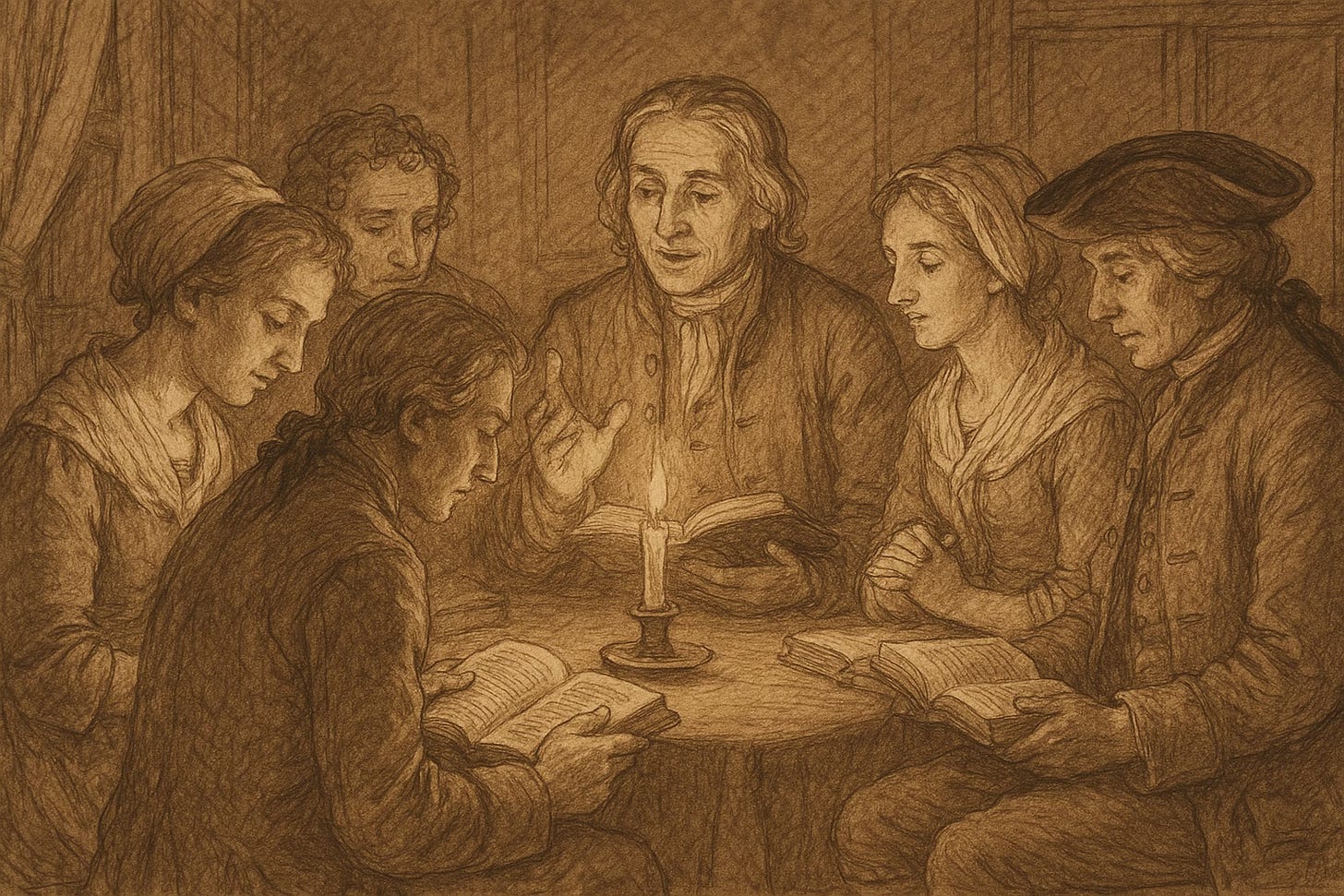Discipleship Is Not Optional: Why Wesley’s Vision for Small Groups Still Matters
Reflections on Chapter 7 of Ten Great Ideas from Church History: A Vision for Growth
I first wrote these reflections while I was in seminary, during a course that explored key ideas from Church history and how they shaped Christian growth. Chapter 7 introduced me to John Wesley’s approach to discipleship, an approach I found not only historically compelling but deeply relevant. What struck me most was Wesley’s insistence that conversion alone was not enough. Faith had to be nurtured, shaped, and lived out in community.
And for Wesley, that kind of spiritual formation happened best in small groups.
At the time, I was involved in a discipleship group. I had experienced both the richness and the complexity of those communities. The joy of spiritual friendship and the challenge of spiritual leadership. But now, years later, I find myself in a different season. I’m not part of a small group at the moment. But I long for one. And rereading this chapter recently reminded me why.
Wesley’s Concern: Not Just Converts, but Disciples
Wesley believed that the Church’s task was not simply to bring people to a moment of faith, but to help them grow into the likeness of Christ. Baptism and confession were not endpoints. They were the beginning of a journey marked by obedience, transformation, and holiness.
To that end, Wesley designed small group structures such as class meetings and bands, to provide the kind of regular, disciplined environment where this growth could happen.
These were not passive gatherings. They were communities of accountability and encouragement. Group members asked each other searching questions about their spiritual health. They confessed sin. They encouraged one another. And they did so regularly. It was a rhythm of grace, shaped by a commitment to intentional growth.
I had assumed the rise of small groups was a modern phenomenon, a response to the challenges of large churches or Western individualism. But I was surprised to discover that Wesley’s model was over 300 years old. Its staying power testifies to its spiritual wisdom.
Beyond the Sermon: Why We Need More Than Sunday
Wesley understood that Sunday preaching alone could not sustain a Christian’s growth. As important as the public proclamation of Scripture is, it cannot offer the depth of relationship and personal application that smaller, more intimate settings provide.
Small groups create space for real relationship for being known, challenged, encouraged, and formed. In a small group, you don’t just hear God’s Word; you wrestle with it, live it, and walk it out with others. In a large church, it’s easy to hide. But in a group of five to ten people, anonymity fades. You begin to be seen.
Wesley’s design had a dual purpose: not only to strengthen individual members but also to equip leaders. In walking with others, group leaders were shaped in their own discipleship. And in time, members would be raised up to lead groups themselves creating a multiplying effect of spiritual formation and mission.
Not Just for the New, but for the Nominal
What I found especially compelling in Wesley’s model is that it wasn’t limited to new believers. It also addressed the needs of nominal Christians. Those who had grown passive in their faith but were experiencing spiritual awakening. Discipleship wasn’t a remedial path; it was the Christian life.
This is an important reminder. We often assume that mature Christians no longer need structured accountability or community formation. But spiritual stagnation can affect anyone. Wesley saw small groups not as spiritual training wheels but as essential spaces for ongoing formation for all believers, at every stage.
Discipleship, after all, requires discipline. And in our fragmented, hurried world, it’s hard to cultivate that discipline alone.
A Personal Note: My Experience and My Longing
I’ve been part of several discipleship groups over the years. Some were fruitful; others were less so. I’ve had leaders who were spiritually grounded and others who approached it more like a social event. Some were younger than me, others more seasoned. What became clear to me is that spiritual leadership in a small group is serious work. It requires more than good intentions. It requires equipping.
Unfortunately, I’ve seen churches assign leaders hastily, valuing expansion over formation, visibility over depth. The pressure to grow numerically can sometimes lead to spiritual shortcuts. But discipleship isn’t fast. It takes time, care, and faithful guidance.
Wesley warned against what we might call “cheap grace” — the idea that one could receive the benefits of salvation without being changed by it. That warning still rings true. We need to be mindful of what we’re inviting people into. It’s not just church attendance or polite fellowship. It’s a lifelong journey of following Jesus.
And yet now, in this present season, I find myself without a small group. Not by choice, really. Life, transitions, and location have made community harder to find. But the desire remains perhaps more now than before. I find myself longing for a space where I can be known, challenged, and encouraged again. A space to ask and be asked: How is it with your soul?
Final Thoughts
Discipleship is slow, often hidden work. It requires attention, vulnerability, and a community that’s willing to walk together in grace and truth. John Wesley understood that. His small group structures were not merely pragmatic tools. They were theological statements. They bore witness to a vision of the Church not just as a gathered crowd, but as a growing body.
And that vision still speaks.
In a world of quick fixes and shallow connections, Wesley’s method reminds us that spiritual maturity isn’t accidental. It’s cultivated. And it’s cultivated best when we walk together.
This reflection was originally published on Medium under the “Even Here” publication.
Read it there → Even Here



